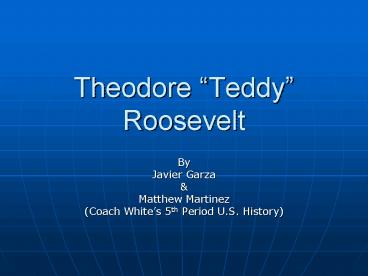Theodore Teddy Roosevelt - PowerPoint PPT Presentation
1 / 13
Title:
Theodore Teddy Roosevelt
Description:
Roosevelt was born in New York City on October 27, 1858, into a wealthy, ... After college, he married Alice Hathaway Lee and began studying at Columbia ... – PowerPoint PPT presentation
Number of Views:72
Avg rating:3.0/5.0
Title: Theodore Teddy Roosevelt
1
Theodore Teddy Roosevelt
- By
- Javier Garza
- Matthew Martinez
- (Coach Whites 5th Period U.S. History)
2
Early Life
- Roosevelt was born in New York City on October
27, 1858, into a wealthy, prominent New York
family. - As a child, he suffered from nearsightedness and
asthma. As a youth, he participated in a
strenuous bodybuilding program to overcome his
asthma and general weakness.
3
Adult life
- He studied with tutors until he went to college
at Harvard, where he earned good grades, wrote a
book, The Naval War of 1812 (published in 1880),
and graduated Phi Beta Kappa in 1880. - After college, he married Alice Hathaway Lee and
began studying at Columbia University Law School.
In 1881 at the age of 23, he was elected to the
New York state assembly and reelected to two more
annual terms in 1882 and 1883.
4
Police Commissioner
- Roosevelt was appointed police commissioner in
New York City in 1895 and again fought the
corruption in the police department, which
angered Democrats and Republicans alike. He even
walked the streets at night to catch policemen
sleeping on the job. In 1896, he supported
Republican presidential nominee William McKinley
and applied for a position in Washington.
McKinley was disinclined to bring such an upstart
into his administration, but Roosevelt's
political support was too strong, and McKinley
finally appointed him the assistant secretary of
the navy.
5
Vice-Presidency
- After the war, he returned to New York, where
several powerful groups urged him to run for
various public offices. U.S. Senator Thomas C.
Platt, New York's Republican boss, did not like
Roosevelt, but he needed a candidate who could
win the governor's race. Roosevelt accepted
Platt's offer and won the election, but he
refused to follow orders and even pushed through
the legislature a bill to require taxes from
public utility franchises. This hurt Platt
directly since he had taken money from these
utilities to prevent them from having to pay
taxes. More than any of the other reforms that
Roosevelt initiated, this tax irritated Platt so
much that he pressed President McKinley to take
Roosevelt as his vice presidential running mate.
Finding a new vice president was necessary since
Garret Hobart, McKinley's first vice president,
had died in 1899.
6
Rise to Presidency
- September 14, 1901, Roosevelt became the
President of the United States after President
McKinley was assassinated.
7
Early Days
- Early on, Roosevelt tried to convince businessmen
that he would not interfere with them, but he
never quite succeeded. In December 1901, in his
first address to Congress, he praised industrial
leaders but pointed out that some of them had
done "real and grave evils." By 1902, inflation
was high, and the citizenry blamed the trusts for
high prices. Roosevelt responded by ordering his
Justice Department to file an antitrust action
against the Northern Securities Company, a
holding company run by the richest men in the
United States to control railroad rates.
8
Rough Riders
- The First Cavalry Regiment during the
Spanish-American War, commanded by Theodore
Roosevelt, was informally known as the Rough
Riders and became famous for its charge up Kettle
Hill during the Santiago campaign in Cuba.
9
Elkins Act
- Roosevelt sponsored the 1903 Elkins Act to
prohibit railroads from rebates (or kicking back
money) to favored shippers, which put rivals out
of business, but such practices had not stopped.
Roosevelt then pushed Congress to pass the 1906
Hepburn Railway Rate Act to reduce the evil
rebates, although they still were not stopped
entirely.
10
The Great White Fleet
- Roosevelt had pushed for major increases in U.S.
naval strength, built 16 new battleships and
cruisers, and moved the United States from having
the fifth largest navy at the beginning of his
term to being the second only to the British by
the end of his term. In a show of strength, he
then sent his navypainted whitearound the world
as the Great White Fleet.
11
Roosevelts Retirement
- After his failure to achieve presidency again,
Roosevelt "retired" to an exhausting and nearly
fatal South America journey, and he continued to
write. While he complained about President
Wilson's foreign policy, he supported Wilson on
the war. In fact, he tried to persuade Wilson to
let him organize another volunteer division as he
had during the Spanish-American War.
12
Roosevelts death
- Roosevelt was clearly planning to run for the
Republican nomination in 1920 when he would have
been only 62 years old. Most observers believe he
might have won, but he had many serious medical
conditions, and he died on January 6, 1919.
13
Citations
- Text Citation
- "Roosevelt, Theodore." American History Online.
Facts On File, Inc. http//www.fofweb.com/activeli
nk2.asp?ItemIDWE52iPinAHI0174SingleRecordTru
e (accessed November 18, 2008). - Image Citation
- "Roosevelt, Theodore." Library of Congress.
Prints and Photographs Division. American History
Online. Facts On File, Inc. http//www.fofweb.com/
activelink2.asp?ItemIDWE52iPinAHI0174SingleRe
cordTrue (accessed November 18, 2008).































